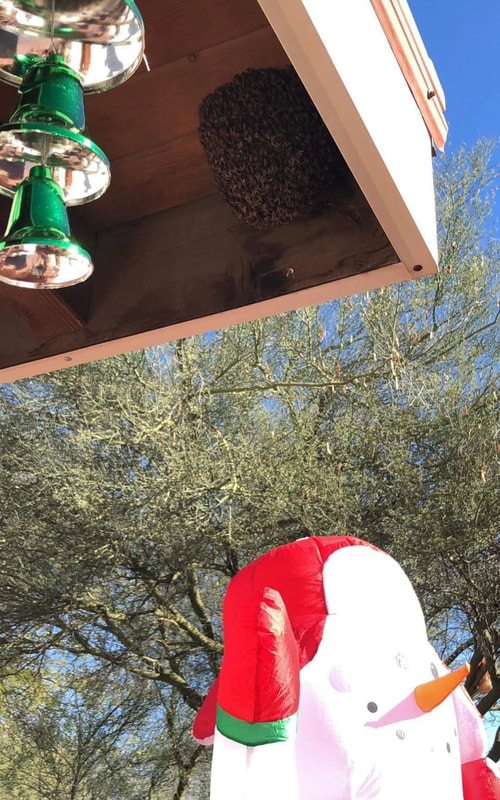It is December 1st (2018) and still unseasonably warm. Temperatures reaching up to the low 80's by day and evenings getting a hair chilly in the mid 40's. So what are the bees doing? They are very active looking for nectar and pollen, however there are not many flowers available at this time of year. So the forage worker bees are expending energy and using their honey storage. If you are a hive managed by a beekeeper that may not be a problem for you. The beekeeper will make you up some sugar syrup and protein supplement patties to feed to you so keep you healthy and happy. Some beekeepers may even put out open feeders so you feel like you have foraged something and can return to the hive with a sense of accomplishment.
But what if you have no beekeeper to care for you? What happens in feral hives? Multiple late season removals that were newer colonies or that got a late start getting established that I have recently done have had little to no honey stores. It is a trait of the Africanized Hybrids (AHB) that if you run out you to try to find some to steal or look for a new location that may have something to forage. Usually, during times of dearth, it is the former rather than the later. AHB are good honey producers but horrible managers. AHB tend to have more aggressive traits than the European Honeybees and this includes towards other bees. They will find a thriving hive, fight the guard bees, overcome and dethrone the European queen and take it over. It is like an end of the world scenario for them so they kill and steal a new home with food storage versus starvation. Can't say I blame them.
Other reasons can also cause late season "swarming" such as heavy mite infestations. Mites have been known to cause a colony to leave their home. Ants or skunks or any other pesky critter continuously attacking a hive could cause them to get so annoyed that they leave. Unfavorable conditions such as partial exterminations, flooding, etc. that causes structural damages can also cause bees to abscond.
During the late season fall or even dearth during summer this is what you are not seeing: an abundance of nectar flow causing an exploding population making the hive want to naturally split to reproduce another hive by the old queen leaving with a percentage of the bees (also known as swarming). I tend to call late season or bees that abscond during a dearth a "suicide swarm". Chances are extremely slim for these bees unless a beekeeper can get to them and is willing to put a large amount of resources into saving them.
Non-beekeepers don't care what the real terms are. All they know is that unwanted visitors are hanging in a ball somewhere to close for comfort.

 RSS Feed
RSS Feed